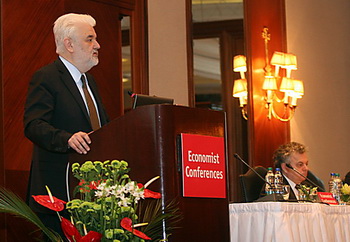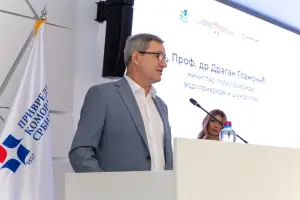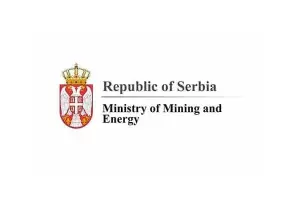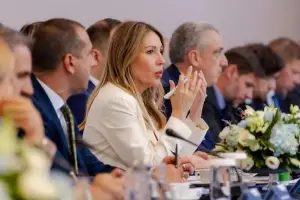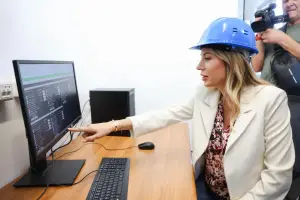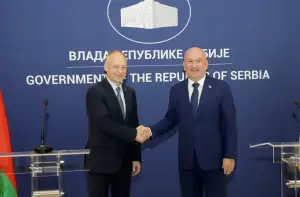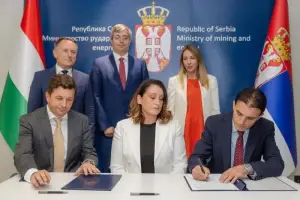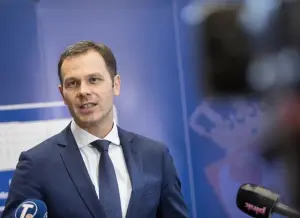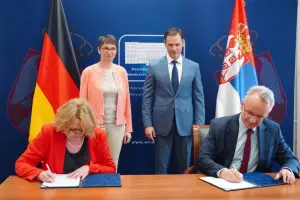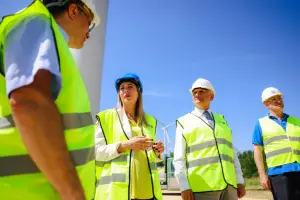Q:
A:
€1.5b to cover budget deficit
Belgrade,
18 March 2009
Serbian Prime Minister Mirko Cvetkovic stated today that Serbia needs between €1.2 and €1.5 billion to cover this year’s budget deficit.
In a round table debate organised by London-based Economist magazine, Cvetkovic said that the money will be provided from international financial institutions, commercial banks and the EU.
A good arrangement with the International Monetary Fund (IMF) will be necessary in order to get loans from international creditors, Cvetkovic said, noting that negotiations with the IMF started on March 16.
He said that the talks will be finished by the end of next week and added that the main topics of the talks are reductions in public spending and how to increase the budget deficit.
Cvetkovic said that Serbia’s budget deficit will be at least 3% of GDP although it was previously projected at 1.75% of GDP.
The deficit will be increased in agreement with the IMF following the budget revision in May or early June, said Cvetkovic.
Some 10 to 15 options are being considered to reduce public spending, he said.
Cvetkovic recalled that those who are richer will have to take the bigger burden of the economic crisis and noted that the government is trying to adhere to the principle of solidarity and to ensure that salaries and pensions are not decreased.
He noted that big savings can be made in local administrations by reducing expenses for travel and vehicles.
The government will apply adequate measures during the crisis the Prime Minister said, noting that the state will have to spend money on capital investments as it is unlikely to receive foreign investments.
Cvetkovic confirmed that a tender for gas plants in Novi Sad will be announced in the upcoming days, noting that the government is taking measures to provide energy security.
The Prime Minister recalled that tenders for strategic partners for thermal plants Kolubara B and Nikola Tesla B have been announced, noting that several letters of interest have been received.
Cvetkovic also confirmed that in order to make the energy sector more competitive, new energy operators will come to the Serbian market.
Deputy Prime Minister Bozidar Djelic said that the EU Council of Ministers and the European Parliament will positively evaluate Serbia’s progress regarding its inclusion in the Schengen ‘white list’.
He said that the European Commission is currently preparing a report, which it will forward to the EU Council of Ministers and the European Parliament in April.
According to EU experts Serbia has made progress in this respect, said Djelic, adding that more than 330,000 biometric passports have already been issued.
Other topics of the round table include the situation in the national economy, stability of business and consumer sectors, the dinar exchange rates, corporate financing, EU-related reforms and competitiveness on the global market.
Government representatives will present privatisation plans for socially-owned property, securing the country’s energy sources and investment opportunities in Serbia.
The themes will also focus on how to promote infrastructure, prospects for reform and how companies should respond to crisis.
Some of the participants include Minister of Foreign Affairs Vuk Jeremic, Deputy Prime Minister and Minister of Economy and Regional Development Mladjan Dinkic, Minister of Finance Diana Dragutinovic, Deputy Prime Minister for EU Integration and Minister of Science and Technological Development Bozidar Djelic, Governor of the National Bank of Serbia Radovan Jelasic, Head of the European Commission Delegation to Serbia Josep Lloveras and Head of the World Bank office for Serbia Simon Gray.
A good arrangement with the International Monetary Fund (IMF) will be necessary in order to get loans from international creditors, Cvetkovic said, noting that negotiations with the IMF started on March 16.
He said that the talks will be finished by the end of next week and added that the main topics of the talks are reductions in public spending and how to increase the budget deficit.
Cvetkovic said that Serbia’s budget deficit will be at least 3% of GDP although it was previously projected at 1.75% of GDP.
The deficit will be increased in agreement with the IMF following the budget revision in May or early June, said Cvetkovic.
Some 10 to 15 options are being considered to reduce public spending, he said.
Cvetkovic recalled that those who are richer will have to take the bigger burden of the economic crisis and noted that the government is trying to adhere to the principle of solidarity and to ensure that salaries and pensions are not decreased.
He noted that big savings can be made in local administrations by reducing expenses for travel and vehicles.
The government will apply adequate measures during the crisis the Prime Minister said, noting that the state will have to spend money on capital investments as it is unlikely to receive foreign investments.
Cvetkovic confirmed that a tender for gas plants in Novi Sad will be announced in the upcoming days, noting that the government is taking measures to provide energy security.
The Prime Minister recalled that tenders for strategic partners for thermal plants Kolubara B and Nikola Tesla B have been announced, noting that several letters of interest have been received.
Cvetkovic also confirmed that in order to make the energy sector more competitive, new energy operators will come to the Serbian market.
Deputy Prime Minister Bozidar Djelic said that the EU Council of Ministers and the European Parliament will positively evaluate Serbia’s progress regarding its inclusion in the Schengen ‘white list’.
He said that the European Commission is currently preparing a report, which it will forward to the EU Council of Ministers and the European Parliament in April.
According to EU experts Serbia has made progress in this respect, said Djelic, adding that more than 330,000 biometric passports have already been issued.
Other topics of the round table include the situation in the national economy, stability of business and consumer sectors, the dinar exchange rates, corporate financing, EU-related reforms and competitiveness on the global market.
Government representatives will present privatisation plans for socially-owned property, securing the country’s energy sources and investment opportunities in Serbia.
The themes will also focus on how to promote infrastructure, prospects for reform and how companies should respond to crisis.
Some of the participants include Minister of Foreign Affairs Vuk Jeremic, Deputy Prime Minister and Minister of Economy and Regional Development Mladjan Dinkic, Minister of Finance Diana Dragutinovic, Deputy Prime Minister for EU Integration and Minister of Science and Technological Development Bozidar Djelic, Governor of the National Bank of Serbia Radovan Jelasic, Head of the European Commission Delegation to Serbia Josep Lloveras and Head of the World Bank office for Serbia Simon Gray.

